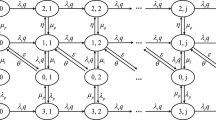Abstract
Cooperative communication is a promising technique to improve utilization of the wireless spectrum resource. However, due to the limited wireless network resource, the selfish relay nodes may be unwilling to offer their relay help without any extra incentive. In this work, we study a contract-based mechanism for incentivizing cooperative relay in the presence of the dual asymmetric information. By modelling multi-user cooperative relay as a labour market, a principal-agent model is proposed with the combination of relay power, basic wage and relay bonus in the continuous type scenario. And an optimization problem of multi-user relay incentive is formulated to achieve the twin objectives of ability-discrimination and effort-incentive. Numerical results show that the optimal contract design scheme is effective in improving the performance of cooperative communication.








Similar content being viewed by others
References
Nosratinia, A., Hunter, T. E., & Hedayat, A. (2004). Cooperative communication in wireless networks. IEEE Communications Magazine, 42(10), 74–80.
Laneman, J. N., Tse, D. N. C., & Wornell, G. W. (2004). Cooperative diversity in wireless networks: Efficient protocols and outage behavior. IEEE Transactions on Information Theory, 50(12), 3062–3080.
Shastry, N., & Adve, R. (2006). Stimulating cooperative diversity in wireless ad hoc networks through pricing. In IEEE International Conference on Communications, IEEE ICC 2006, 2006, pp. 3747–3752.
Astaneh, S. A., & Gazor, S. (2009). Resource allocation and relay selection for collaborative communications. IEEE Transactions on Wireless Communications, 8(12), 6126–6133.
Hong, X., Wang, J., Wang, C., & Shi, J. (2014). Cognitive radio in 5G: A perspective on energy-spectral efficiency trade-off. IEEE Communications Magazine, 52(7), 46–53.
Zhang, G., Yang, K., Liu, P., & Feng, X. (2013). Incentive mechanism for multiuser cooperative relaying in wireless ad hoc networks: A resource-exchange based approach. Wireless personal communications, 73(3), 697–715.
Duan, L., Gao, L., & Huang, J. (2014). Cooperative spectrum sharing: A contract-based approach. IEEE Transactions on Mobile Computing, 13(1), 174–187.
Cong, L., Zhao, L., Zhang, H., et al. (2011). Pricing-based game for spectrum allocation in multi-relay cooperative transmission networks. IET Communications, 5(4), 563–573.
Wang, B., et al. (2009). Distributed relay selection and power control for multiuser cooperative communication networks using Stackelberg game. IEEE Transactions on Mobile Computing, 8(7), 975–990.
Gao, L., Huang, J., Chen, Y. J., & Shou, B. (2013). An integrated contract and auction design for secondary spectrum sharing. IEEE Journal on Selected Areas in Communications, 31(3), 581–592.
Sheng, S., & Liu, M. (2014). Profit incentive in trading nonexclusive access on a secondary spectrum market through contract design. IEEE/ACM Transactions on Networking, 22(4), 1190–1203.
Zhao, N., Wu, M., Xiong, W., & Liu, C. (2015). Cooperative communication in cognitive radio networks under asymmetric information: A contract-theory based approach. International Journal of Distributed Sensor Networks, 2015(676195), 1–11.
Zhao, N., Wu, M., Xiong, W., & Liu, C. (2015). Optimal contract design for cooperative relay incentive mechanism under moral hazard. Journal of Electrical and Computer Engineering, 2015(690807), 1–7.
Bolton, P., & Dewatripont, M. (2005). Contract theory. Cambridge: MIT Press.
Salanié, B. (2005). The economics of contracts: A primer. Cambridge: MIT Press.
Gibbons, R. (2005). Incentives between firms (and within). Management Science, 51(1), 2–17.
Laneman, J. N., & Wornell, G. W. (2003). Distributed space-time-coded protocols for exploiting cooperative diversity in wireless networks. IEEE Transactions on Information theory, 49(10), 2415–2425.
Acknowledgments
This work was supported by National Natural Science Foundation of China (Nos. 61501178, 61471162 and 61601177). The author would like to acknowledge the anonymous reviewers whose constructive criticism, comments, and suggestions led to a greatly improved manuscript.
Author information
Authors and Affiliations
Corresponding author
Ethics declarations
Conflict of interest
The authors declare that there is no conflict of interests regarding the publication of this paper.
Rights and permissions
About this article
Cite this article
Zhao, N., Wu, M., Xiong, W. et al. Incentive Mechanisms for Cooperative Wireless Networks with Adverse Selection and Moral Hazard. Int J Wireless Inf Networks 23, 273–282 (2016). https://doi.org/10.1007/s10776-016-0323-2
Received:
Accepted:
Published:
Issue Date:
DOI: https://doi.org/10.1007/s10776-016-0323-2




